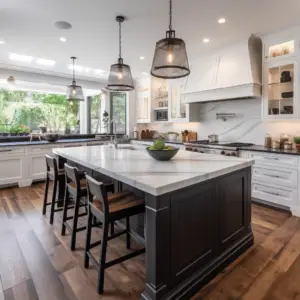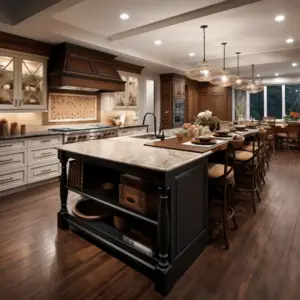Renovating a kitchen can be an exciting experience! But it can also be challenging. With the right plan, you can make this space functional and beautiful. There are many factors to think about, like choosing materials and storage. This article looks at some key aspects of kitchen renovation.
First, decide what you want out of the renovation. Think about cooking habits and family dynamics. This will help you figure out what needs to be done and how much to spend. Make sure the design matches the style of your home for a good look.
Next is selecting materials. From countertops to flooring, look at textures, colors, and finishes that fit your kitchen. Durability is important too – kitchens get a lot of use.
Storage is key to an organized kitchen. Look for innovative ideas to use every inch of available space. Use tall cabinets or open shelves to make the most of unused areas. Install dividers and pull-out drawers for utensils and pots. Clever organization can look and feel great.
Pro Tip: Hire a professional designer or contractor for expert advice. They can help with space usage, storage, and appliance installation. Their experience can make the whole process go smoother.
Renovating your kitchen is an opportunity to make a space just for you. With careful planning, choosing good materials, and optimizing storage, you can make this essential room reflect your uniqueness – and make food prep and gatherings easier.
Table of Contents
Assessing the current state of your kitchen

My buddy recently gave her kitchen a makeover. She was unhappy with the lack of counter space and the old cupboards that couldn’t fit her stuff.
So, she thought hard about what she needed. Then, she asked experts for help. In the end, she got more counter area and new cabinets with better storage.
The result? A kitchen that looked great and was much more useful for her cooking! It goes to show that assessing your kitchen’s current state can lead to great improvements.
Setting a budget for your kitchen renovation
- Evaluate your finances – Look closely at your finances to see how much you can afford for your kitchen renovation.
- Research costs – Find out the typical costs of materials, labor and other fees associated with kitchen upgrades.
- Prioritize and allocate funds – Decide which parts of the kitchen to focus on and give them funds.
- Account for extra expenses – Consider other costs that may come up in the renovation process.
- Plan and consider all aspects – Make sure to think about every aspect of the project.
- Be informed – Make decisions that meet both your style and needs.
- Unforeseen challenges – Many homeowners have experienced extra costs due to unforeseen delays in construction. However, by doing research and working with professionals, you can stick to your budget and get the desired results.
Planning the layout and design of your new kitchen
Focus on workflow for an efficient kitchen. Set up areas like the sink, stove, and fridge to make meal prep a breeze! Utilize storage with pull-out drawers, corner cabinets, and overhead shelves. This will keep countertops clutter-free and everything in place. Aesthetics matter too: choose a color scheme that reflects your style and decorate with backsplashes or pendant lights.
Create a focal point with statement pieces like a range hood or an island. Use versatile lighting for various tasks, focus, brightness, and accenting. Lastly, customize the kitchen based on needs. Love baking? Get a double oven! By considering all these tips, one can plan their kitchen’s layout and design with practicality and style.
Hiring professionals or DIY renovation?
Struggling to decide between a professional or DIY kitchen renovation? Consider the following:
- Expertise: Professionals have the technical know-how and years of experience.
- Budget: DIY can save money. Professionals provide cost estimates.
- Time: Professionals are efficient. DIY takes longer.
- Quality: Professionals guarantee quality. DIY results may differ.
- Complexity: Complex projects should be left to professionals.
- Satisfaction: DIY brings accomplishment. Professionals bring peace of mind.
Hiring professionals also avoids costly mistakes and the need to buy specialized tools.
Here’s a Pro Tip: Talk to multiple professionals. Compare their expertise to your budget and how involved you want to be.
Demolition and preparation
When it’s time to start renovating your kitchen, an essential step is demolishing and prepping the area. This involves taking away existing parts, appliances, and surfaces to make a fresh start for the upcoming changes.
Let’s look into the details of demolition and prep in a table:
| Stage | Details |
|---|---|
| Demolition | Remove cabinets, countertops, and appliances. Disconnect plumbing and electric connections carefully. Protect nearby areas from dust and debris. |
| Surface Prep | Patch holes or cracks in walls and ceiling. Smooth rough areas for new installations. |
Plus, here are some particular things to remember:
- Get experts to do complex tasks like disconnecting gas lines or rewiring electrical connections.
- Take safety measures during demolition to stop damage to nearby areas, so you don’t weaken structural integrity.
- Follow local regulations or hire a waste removal service to get rid of debris.
A homeowner once tried to renovate their kitchen without knowing how to disconnect their gas line. This caused safety issues and expensive repairs due to damage done during the demolition phase.
It’s important to have a plan for demolition and preparation when renovating your kitchen to make sure everything goes smoothly.
Installing new kitchen cabinets and countertops
- Accurately measure the kitchen space to fit the cabinets and countertops.
- Get high-quality materials for durability and resistance.
- Think of the layout and choose the best configuration.
- Hire pro installers for a seamless fit.
- Get customizable options for personalizing the kitchen.
- Remember to seal natural stone countertops regularly.
It’s important to pay attention to every detail during installation. Pick hardware that compliments your style. Make sure the cabinetry has good ventilation. A real-life example proves the importance of professional installation – a couple didn’t hire pros and ended up with ill-fitting cabinets. Invest in experts for an impeccable outcome.
Installing new kitchen appliances
Before buying a new appliance, check that it fits in your kitchen layout and electrical connections. Choose appliances that suit your layout and needs. It’s best to use a trained technician for installation, who can make sure it works properly. Ventilation is important to prevent overheating. Assess the power supply too. Research brands and models before you buy. Ask experts for their views. Create a plan for installation. This will help you have a successful installation and a great cooking experience.
Plumbing and electrical work
Take time to ensure your kitchen’s plumbing and electrical systems are all up to code! Consult with professionals to decide the best layout for pipes, outlets, and switches. Upgrade any old plumbing and electrical lines to make them more efficient and safe. Install lighting fixtures that will both increase functionality and create a cozy atmosphere. Think about energy-efficient appliances and lighting to lower your utility bills. Don’t forget about ventilation to get rid of odors and reduce steam build-up.
To make sure all these tasks are done well, it’s important to find licensed plumbers and electricians with kitchen renovation experience. They can give you tips to maximize space while still adhering to safety protocols.
Also remember that, during the late 19th century, when indoor plumbing became popular in homes, people had a hard time fitting them in their kitchens. Installation required tearing down walls and replacing fixtures. This is an example of how critical it is to plan carefully when dealing with plumbing and electrical work in kitchen renovations.
By focusing on plumbing and electrical work in your kitchen renovation project, you’ll have a space that meets your needs and follows all safety regulations.
Flooring, lighting, and finishing touches

Renovate your kitchen! Flooring, lighting, and the finishing touches are crucial. Consider these key points:
– Flooring: Choose materials like hardwood or tiles that are easy to clean. Select colors and styles that fit your kitchen.
– Lighting: Lights are essential. Use task lights, like under-cabinet lights, and ambient lighting, such as pendant lights or chandeliers. Dimmer switches are good for flexibility.
– Finishing Touches: Cabinet hardware should match your style. Add decorative elements like window treatments or artwork.
Suggestions:
- Eco-friendly flooring like bamboo or cork.
- LED lighting fixtures save energy.
- Light colors create a spacious look.
- Statement pieces like a backsplash or pendant lights.
Choose flooring, lighting, and finishing touches wisely to create a practical and attractive kitchen that expresses your style!
Conclusion
It’s important to plan ahead and pay attention to detail when renovating your kitchen. Follow our guidelines for a successful transformation!
- Consider the layout of the room and optimize storage solutions.
- Invest in durable flooring and countertops.
- Enhance the ambiance with lighting fixtures and color schemes that suit your style.
- Make the kitchen inviting with a mix of ambient, task, and accent lighting.
- Go for lighter shades to make a small kitchen feel bigger.
- Add personality with bold colors.
Frequently Asked Questions
FAQs: How to Renovate My Kitchen
Q1: Where do I start when renovating my kitchen?
A1: Start by setting a budget and determining your goals for the renovation. Then, make a list of the changes you want to make, such as updating appliances or changing the layout.
Q2: Should I hire a professional or do the renovation myself?
A2: It depends on your skills, time availability, and the complexity of the renovation. Hiring a professional can save you time and ensure quality work, but DIY can be cost-effective if you’re confident in your abilities.
Q3: How can I maximize storage space in my kitchen?
A3: Consider adding shelving, cabinets, or a pantry to increase storage. Utilize vertical space, install pull-out organizers, and declutter to optimize your kitchen’s storage capacity.
Q4: What are some popular kitchen design trends?
A4: Some current trends include open shelving, minimalist design, smart appliances, and eco-friendly materials. However, focus on creating a kitchen that reflects your personal style and preferences.
Q5: How long does a kitchen renovation usually take?
A5: The duration varies depending on the scope of the project. A minor renovation can take a few weeks, while a major overhaul might require several months. It’s important to plan accordingly to minimize disruptions.
Q6: How can I minimize costs during a kitchen renovation?
A6: Shop around for the best deals on materials and appliances, consider refacing cabinets instead of replacing them entirely, and prioritize the updates that will have the most impact on your kitchen’s functionality and aesthetics.
